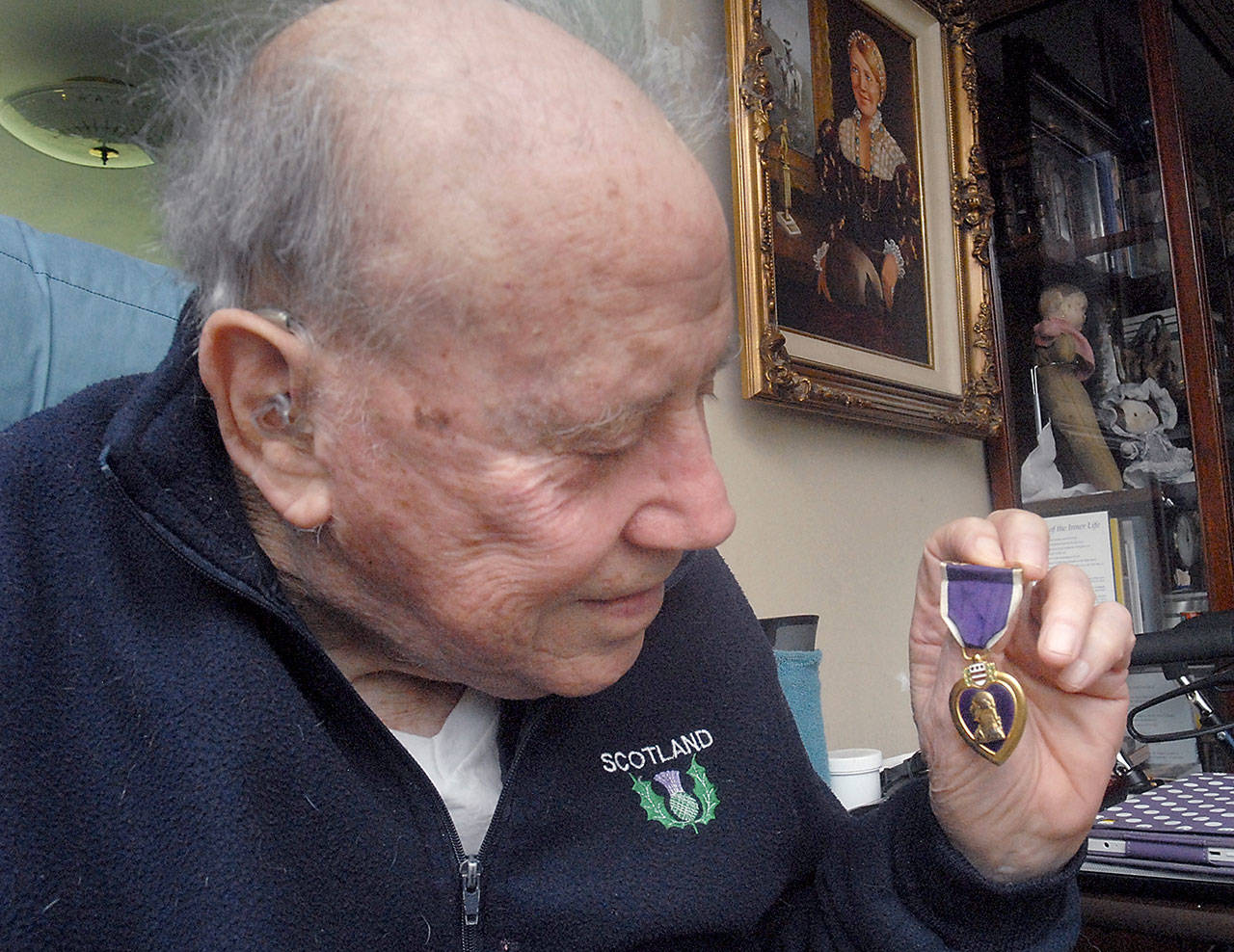PORT ANGELES — The U.S. flag planted high in the Finn Hall Road yard of 91-year-old Marion “Skip” Yandell, a World War II Marine veteran, is curtained by the distant, snow-speckled Olympic Mountains.
Blue Mountain, jutting above sister peaks that walled the horizon, is 6,000 feet, a backdrop for grief-heavy thoughts that make every day Memorial Day for the retired physician, a North Olympic Peninsula resident for more than two decades.
Yandell will share a Memorial Day dinner with family Monday, a meal that has become a tradition.
He reached for memories Friday that dragged him back to the Battle of Iwo Jima, a seminal moment in early 1945 in the defeat of the Imperial Japanese Army.
For 18 days, he fought a heavily fortified, unseen enemy that fired from caves and foxholes, where carnage fell upon his six-man machine-gun squad, where the flag that rose iconically above 540-foot Mount Suribachi, tiny by Blue Mountain standards, has become the flag outside his window.
“When I look at this flag here, that mountain behind it, I think of Suribachi, every single day,” Yandell said Friday, his face tight with sorrow.
Yandell’s seat faced his picture window so he could easily embrace sad memories, the decades paving a path from the 18 bloody and terrorizing days Yandell spent fighting and watching his friends die to the tissues handed to him by his wife of 70 years, Wanda.
“The tears come very, very easy,” said Yandell, the recipient of two Purple Hearts for wounds received in action.
“I think of the guys in my squad. I think of Pee Wee and Charlie and Red.”
Charlie Post was going to marry Red Miller’s sister, Yandell recalled, bowing his head.
“They were all good men,” he said.
Yandell was an 18-year-old high school football player in Marshalltown, Iowa, a farming town slightly larger than Port Angeles, when he signed up for the Marines.
He was Marine No. 912301.
“Every time you wanted something, anything you wanted, you had to come up with your number,” he recalled.
Yandell was part of the initial assault on Iwo Jima for the Feb. 19-March 26, 1945, battle, which would see 6,800 Marines and an estimated 20,000 Japanese die.
The Allies needed a jumping-off point to Japan, just 750 miles away, he said.
The Navy had bombarded the island for 78 straight days, Yandell said
“I thought it would take us only three days to finish it,” he recalled.
Within minutes of landing on Iwo, bullets skipped along the beach and “walked right up” to Yandell 6 inches from his face — killing the man next to him.
He saw a foxhole and ran into it, only to realize it had been dug by Japanese soldiers who then knew where to fire.
Yandell said the only Japanese soldier he saw was he while on guard duty.
He shot him dead.
Enemy soldiers were hidden in fortified tunnels and caves where he knew they were holed up only from the flash of gun muzzles.
“You were shooting at holes in the ground and little caves,” he said. “That’s all you ever saw.
“You would just wait and they would fire at you, you would wait, and they would fire at you and you would fire at them.
“If the first round hit you, you were dead.
“If you don’t die, why, you could fire back at them.”
Yandell was an assistant machine-gunner who fed belts of bullets into the 30 mm weapon.
He heard bullets, too, close up, recalling how he jumped in a foxhole and thought bees were oddly buzzing around his face.
“I thought, ‘What in the world are bees doing here?’
“It wasn’t bees; they were bullets coming this close to my head.
“The very next fellow came up and jumped in the hole and got hit.
“He didn’t make it.”
On Feb. 23, 1945, Yandell’s fourth day on Iwo Jima, he saw the first flag go up on Mount Suribachi, a volcanic ash mountain that was central to the Japanese defense of the island.
A photo by Joe Rosenthal of the second flag-raising won the Pulitzer Prize.
Yandell, sitting in his house about two-tenths of a mile from his driveway, estimated Suribachi was about twice that distance away, about four-tenths of a mile.
“When it went up, there was a huge roar, everybody was roaring,” Yandell recalled.
“I never felt anything so nice as that.
“When the flag went up, the United States moved right to the edge of Suribachi, it felt so good.”
On Yandell’s last day on Iwo Jima, Charlie Post died next to him, his jaw blown off by a hand grenade.
“I was lying on my side, working on Charlie, and I had my foot out there and bang, I got hit in the ankle.
“Then I got hit in the arm.”
On March 8, 1945, he was shipped to Guam.
He was matter-of-fact about surviving when so many others died.
Yandell said he relied on his faith as a Christian.
“I knew that if I was going to die, I’m going to die, and it doesn’t bother me,” he said.
“I just knew I had things to do while I was in the Marine Corps and I was going to do them no matter what.
“I was never really afraid.”
But more than seven decades later, Iwo Jima and the men lost there live on just beyond Yandell’s living room window.
“I suffer more now thinking about the guys than I ever did before when I was in combat,” he said.
Wanda, sitting nearby, offered encouragement.
“You’ve lived their lifetimes for them,” she said.
“You’ve lived that many lifetimes.”
________
Senior Staff Writer Paul Gottlieb can be reached at 360-452-2345, ext. 55650, or at pgottlieb@peninsuladailynews.com.

